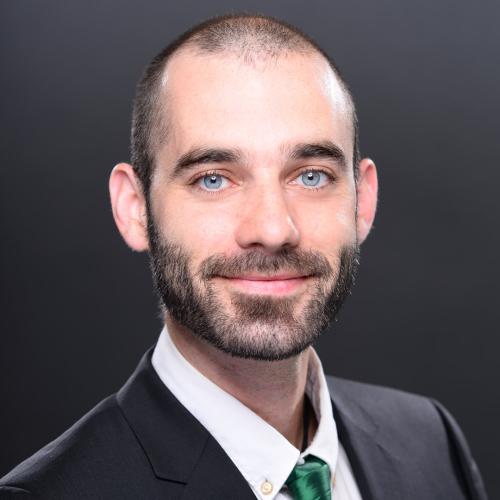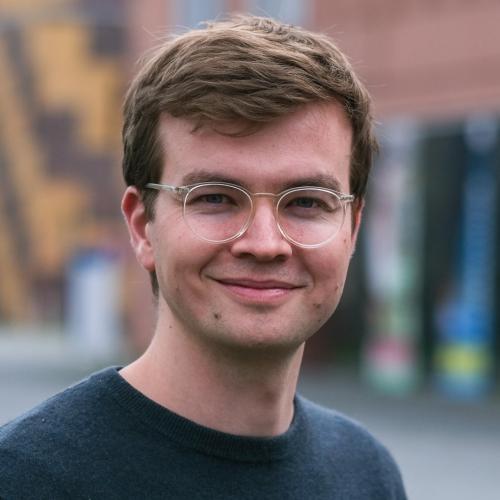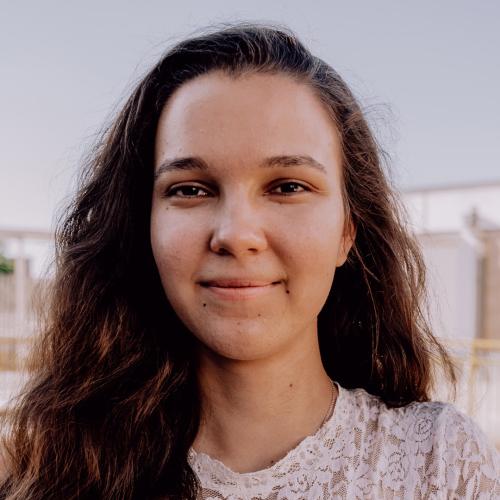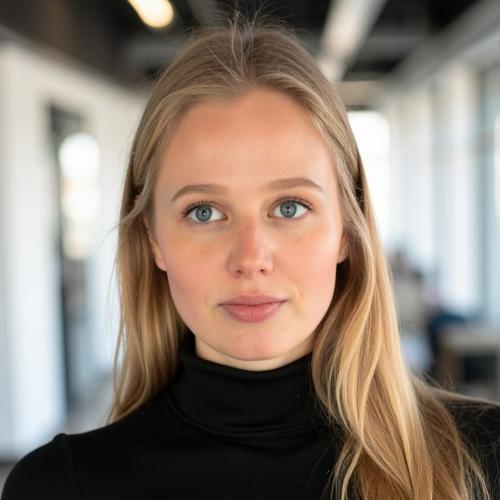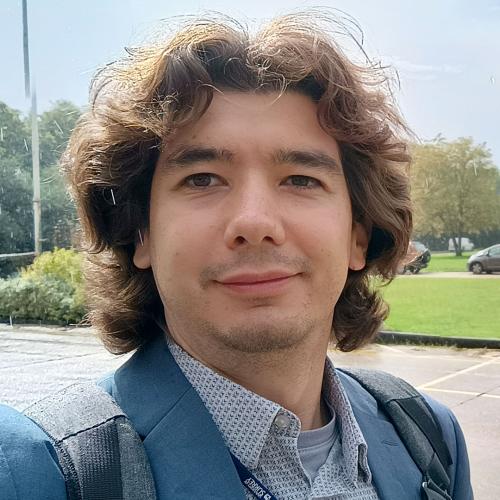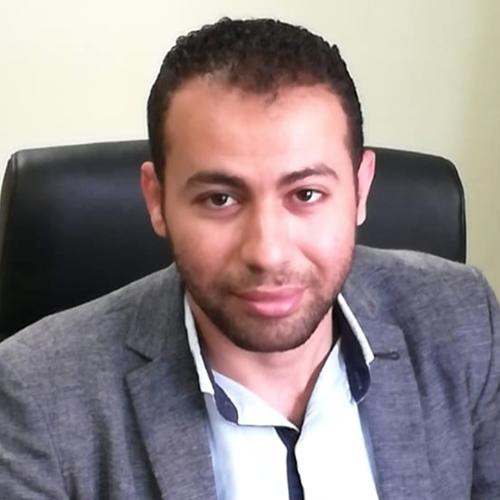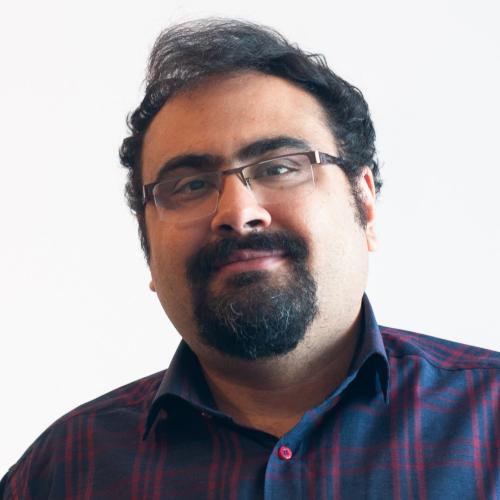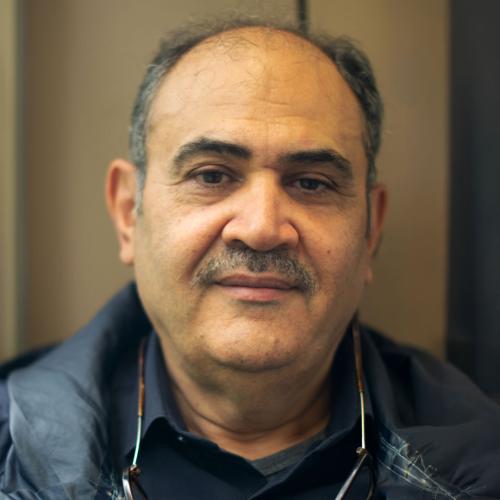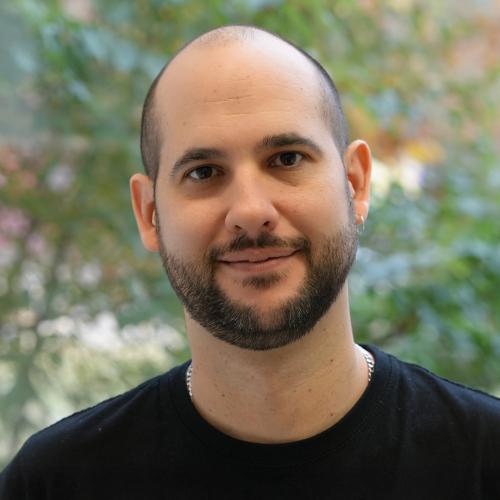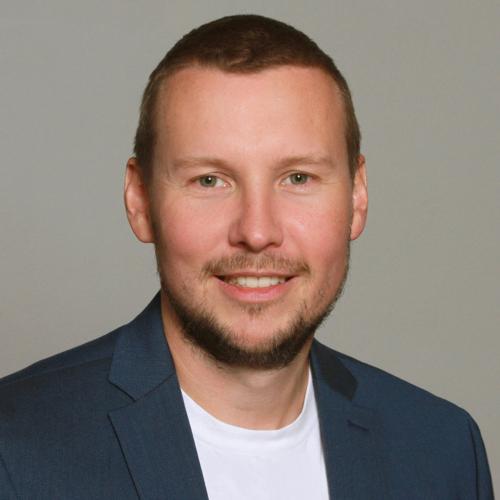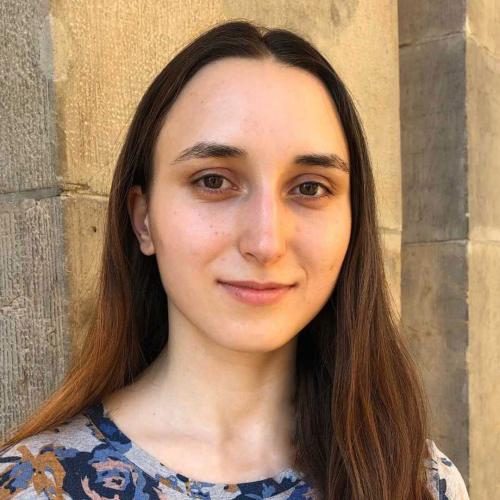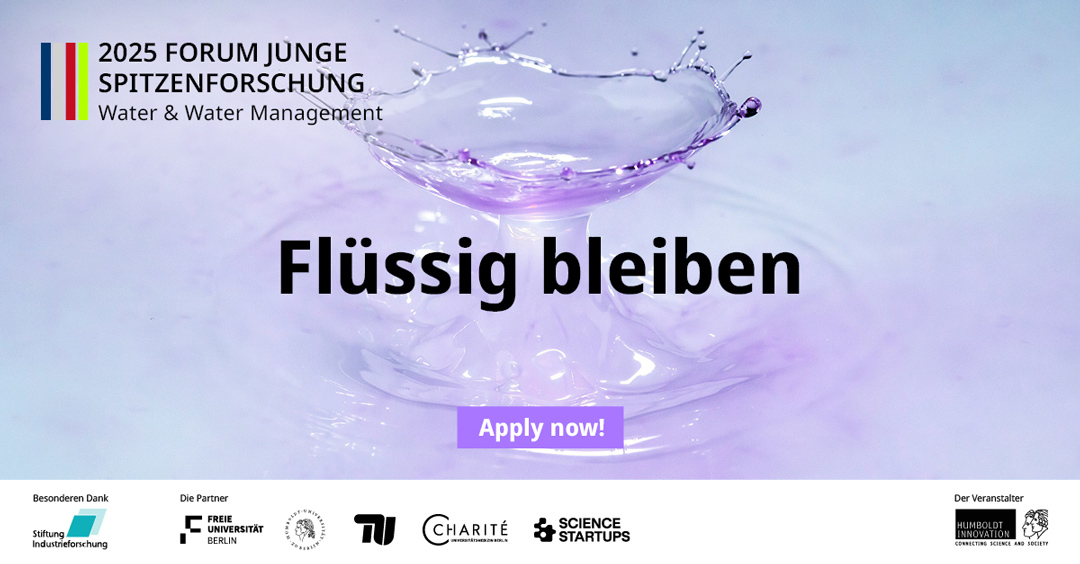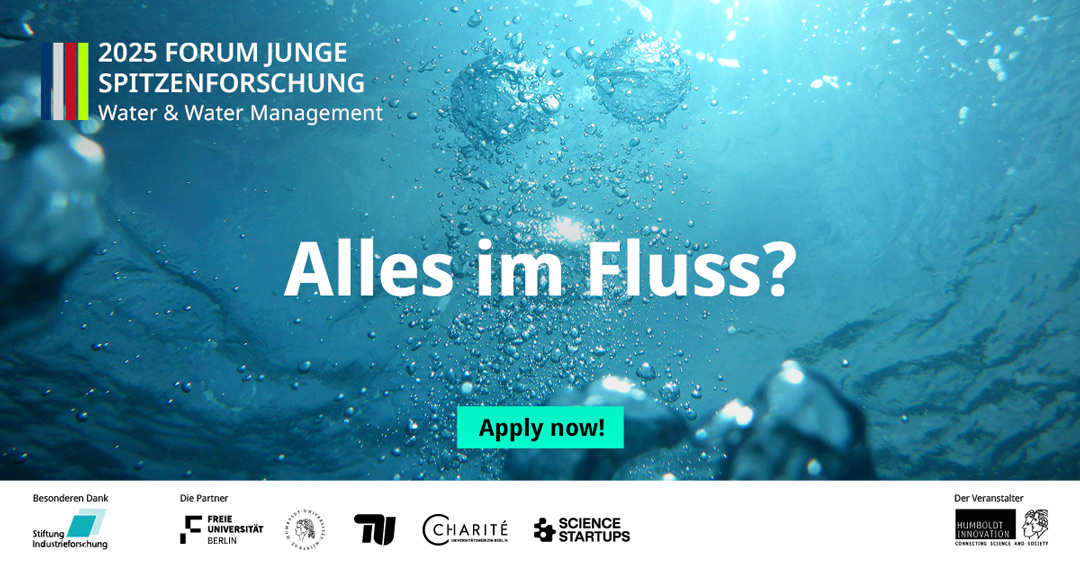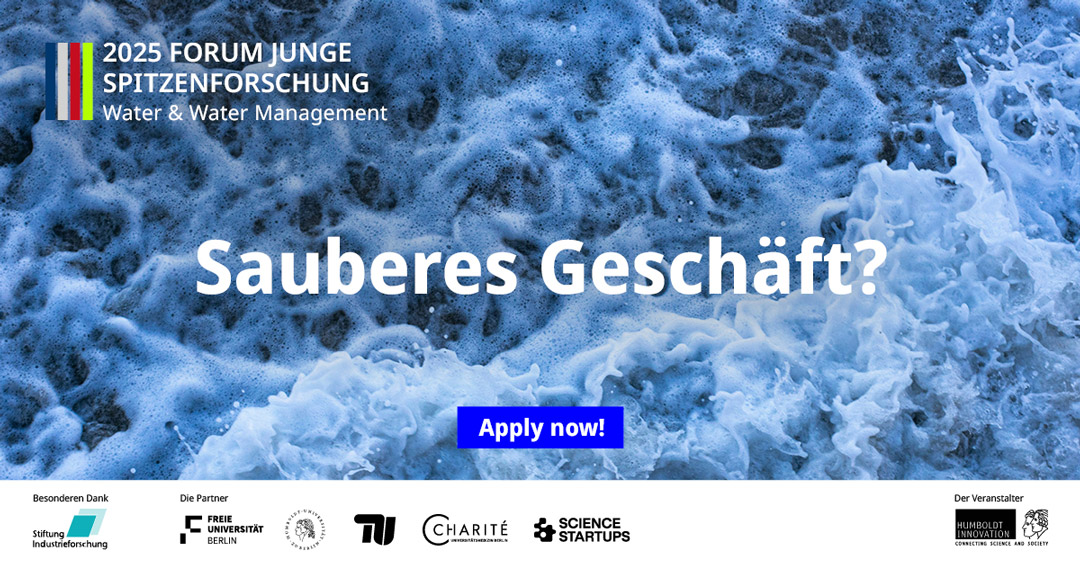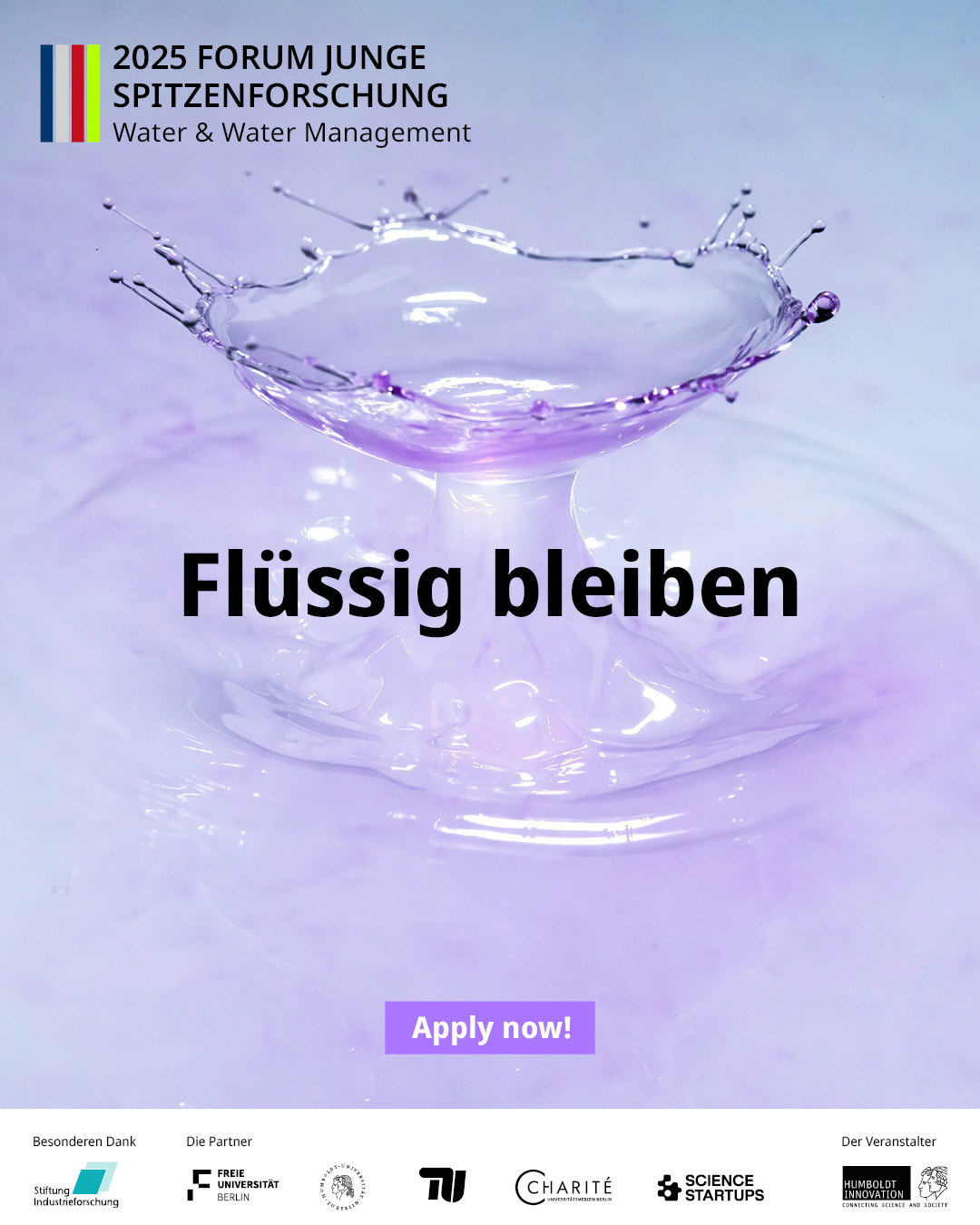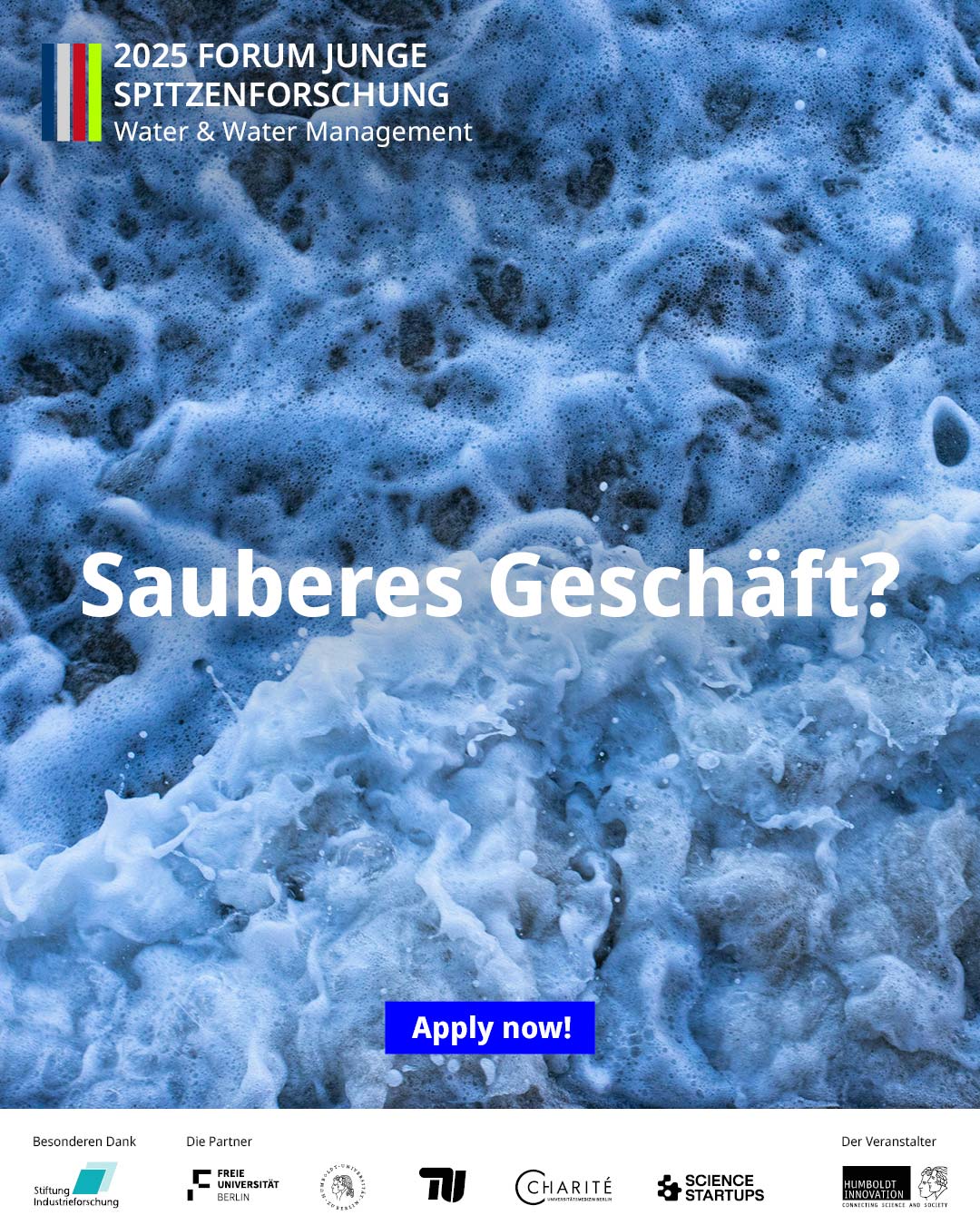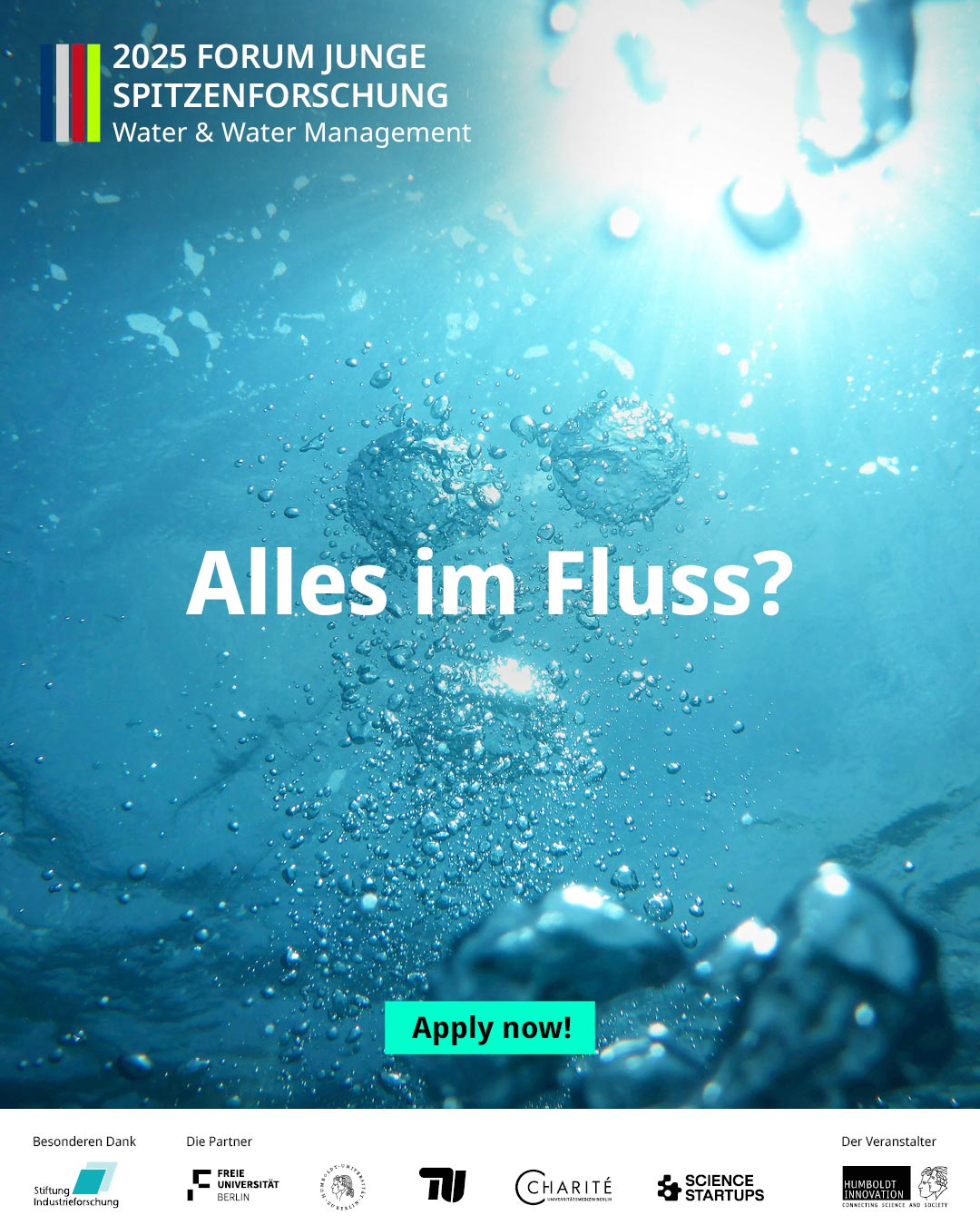Forum Junge Spitzenforschung
Review 2025
The Forum Junge Spitzenforschung honours the most innovative applications in the field of water and water management. Six young researchers received awards.
On 17 November 2025, the twelfth edition of the Forum Junge Spitzenforschung to submit application ideas from their research took place. Six teams of young scientists competed with their ideas before a jury of high-calibre economic experts and an audience for first place, which came with a prize of €12,000 to be used freely in the context of their own research! Second and third place were awarded €10,000 and €8,000 respectively, and the remaining finalists received prize money of €4,000.
The following research projects were awarded prizes for their application ideas:
1st place: Bio-Adsorberperlen zur Wasseraufreinigung, Freie Universität Berlin
2nd place: DeepANN-Hydro3D, Technische Universität Berlin
3rd place: iOLE - intelligent online leak detection, Technische Universität Berlin
The following projects tied for 4th place:
CompactWater, Freie Universität Berlin
High-performance atmospheric water harvester (HYVEST), Humboldt-Universität zu Berlin
Ecopotfilter – Modular Biopolymer Based Water Filtration for Heavy Metal Ion removal, Humboldt-Universität zu Berlin
Contact
Jury & Speaker
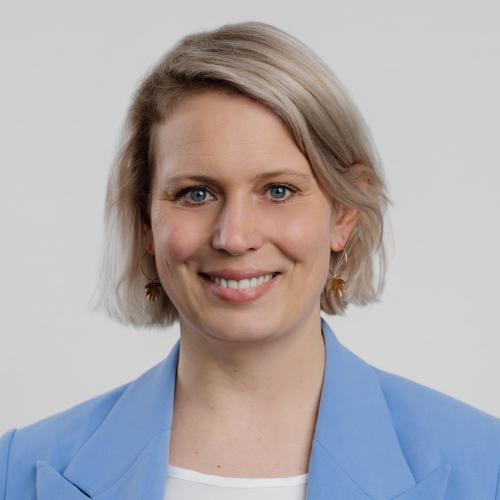
Dr. Lisa Broß

Dr. Lisa Broß
Managing Director | German Association for Water, Wastewater and Waste (DWA)
Dr Lisa Broß is Federal Managing Director of the German Association for Water, Wastewater and Waste (DWA) and shapes the water management debate in Germany with strategic foresight and strong communication skills. As an expert in climate adaptation, flood protection and watercourse development, she brings scientific depth to political processes. Her work combines research, practice and politics. Lisa Broß serves as a juror, moderator and catalyst in research dialogues, advisory boards and funding project evaluations. In the DWA podcast Kanal Royal, she brings science, politics and society into conversation.
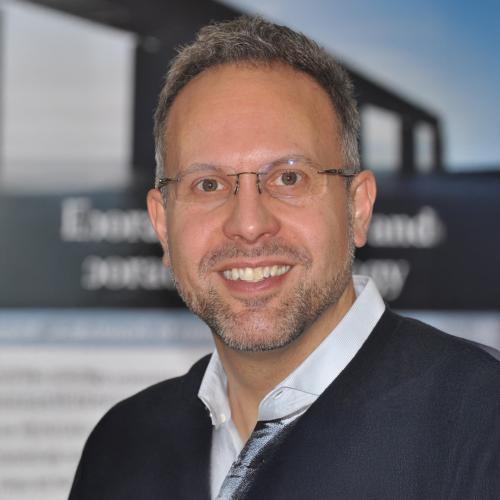
Dr. Christian Doyé

Dr. Christian Doyé
Project Manager | Siemens AG
Christian Doyé works in the technology field „Sustainable Energy and Infrastructure“ at Siemens AG's Foundational Technology division. Here, he is responsible for the sustainable transformation of digital ecosystems to improve water infrastructure and water management. The focus is on developing solution strategies for decarbonisation and optimising processes to increase resource efficiency. After completing his chemistry degree at Freie Universität Berlin in 2001 and obtaining his doctorate in the field of substrate development for high-temperature superconductivity (2005), he began working as a project manager for materials and surface technology in the central research department of Siemens AG. As part of the corporate strategy, Christian Doyé contributed to the development of prospective technology scenarios in innovation management. These focused on the evaluation of potential applications and cooperation between science, start-ups and industry. In addition, he pursued cross-technology topics in management consulting. This involved evaluating synergies, deriving necessary R&D measures and implementing future business models. In his current role, he promotes the transfer of internal research results in the field of water/water management from central research to the divisions of Siemens AG.
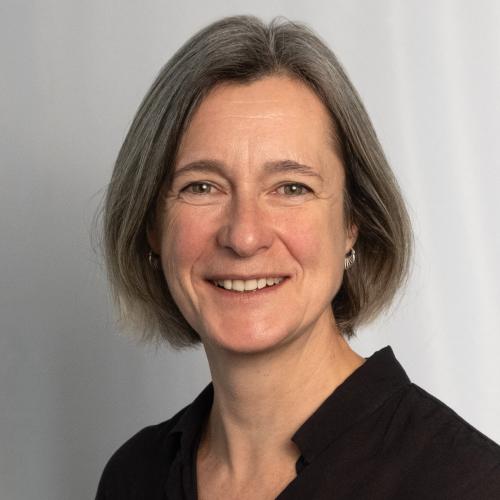
Dr. Pascale Rouault

Dr. Pascale Rouault
Managing Director | KWB Kompetenzzentrum Wasser Berlin gGmbH
Dr Pascale Rouault studied mathematics and water engineering in Grenoble. After completing her doctorate in structural hydraulic engineering at Technische Universität Berlin in 2003, she worked as deputy head of the department. From 2006 onwards, Dr Pascale Rouault focused primarily on the further development of drainage systems and associated water protection in urban areas. Rainwater management, bathing water, asset management of sewers, water-sensitive urban development design and digital solutions for water management are topics that she and her team worked on for 15 years at the Kompetenzzentrum Wasser Berlin (KWB), most recently as department head and authorised signatory. In 2022, she took over as Head of Water Management and Neighbourhood Development at HAMBURG WASSER. In 2024, she returned to KWB as Managing Director to work with a multidisciplinary team of around 40 scientists to advance applied research on a wide range of issues relating to water management and the urban water cycle.
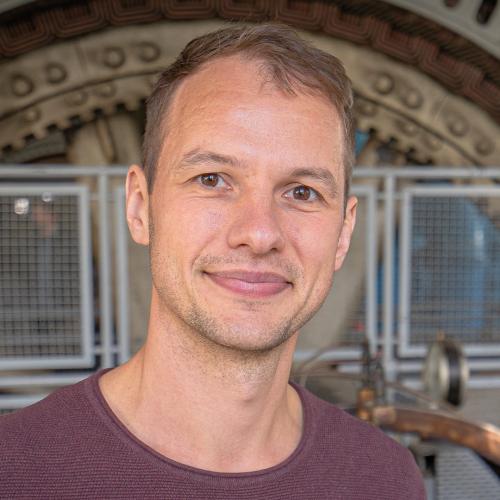
Dr. Johannes Altmann

Dr. Johannes Altmann
Head of the Waterworks Coordination department | Berliner Wasserbetriebe
Johannes Altmann heads the Waterworks Coordination department at Berliner Wasserbetriebe, Germany's largest water supply and wastewater disposal company. After studying energy and process engineering at the Technische Universität Berlin, he obtained his doctorate in 2016 in the field of water pollution control, focusing on the removal of trace substances such as industrial chemicals and pharmaceutical residues from the water cycle using technical options. He then joined Berliner Wasserbetriebe, where he was initially responsible for the planning and construction of process engineering plants for water treatment. Since 2025, he has been responsible for the central control of drinking water supply, from groundwater management and well construction to technical treatment and the overall coordination of water distribution.
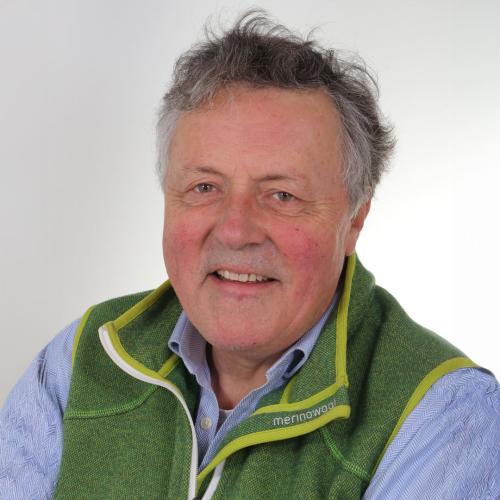
Ulf Leonhard

Ulf Leonhard
Management | Leonhard Ventures | Ulf Leonhard e.K.
Since 1997, Ulf Leonhard has been organising networking events to bring start-ups together with investors and customers/partners. Nationally and internationally, approx. 270 events. For this he can draw on a huge global network. Since 2010, he has been organising WATERVENT (www.watervent.com) with a focus on water technologies and nexus: 32 events with approximately 6,400 participants throughout Europe, the UAE and the USA (Philadelphia, New York City, Cincinnati, San Francisco). He has lived in Berlin since 1996 and in Potsdam since 2017.
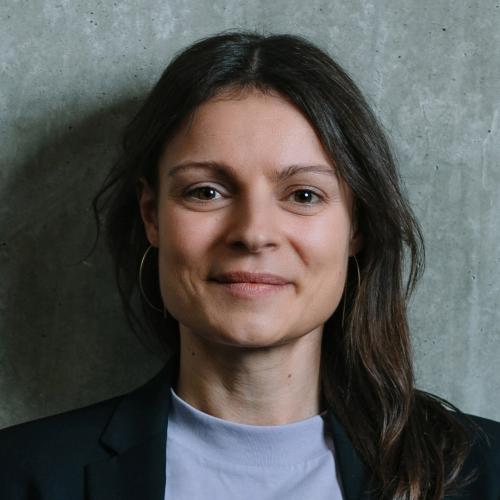
Laura Möller

Laura Möller
CEO | UNITE
Laura Möller is CEO of UNITE, the startup factory for Berlin-Brandenburg, and founder of AI NATION (formerly K.I.E.Z.).
UNITE (www.joinunite.de) is jointly supported by partners from science, business, and society and supports young entrepreneurs and ambitious science-based startups. The focus is on the areas of AI, quantum, health, and green technologies.
Möller's mission is to transform the immense potential of Berlin's research institutions into successful startups. As a former VC investor at Burda Principal Investments and IBB Ventures, Laura Möller brings her expertise and network to the table and focuses science transfer for AI and deep tech more strongly on growth so that Berlin-Brandenburg can establish itself as a sustainable location for innovation. She was included in Manager Magazin's list of the 23 most important women in AI in Germany and in Tagesspiegel's “40 under 40” list of Berlin's business leaders.
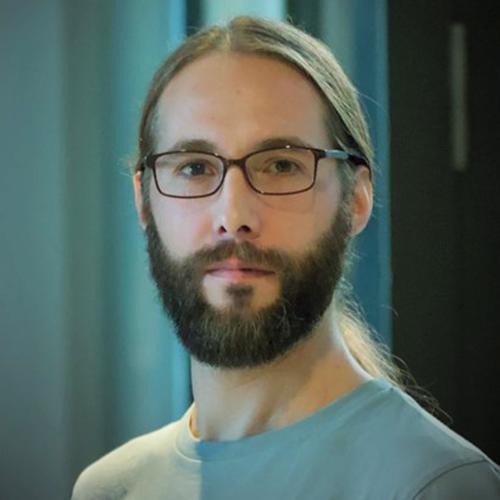
Dr. Paul Knöll

Dr. Paul Knöll
Managing Director | HYB Hydro-Berlin GmbH
Dr Paul Knöll has a PhD in hydrogeology and is the managing director of Hydro-Berlin. There, he heads up the development of ENOLA, a web platform for integrated and cooperative groundwater monitoring. Previously, he worked as a hydrogeologist in both applied research and the private sector. One of his main areas of focus was the development of software tools for analysing and modelling water resources. In numerous projects, Paul Knöll repeatedly observed how complex and time-consuming the handling of environmental measurement data can be. With the founding of HYB Hydro-Berlin GmbH and the development of ENOLA, he and his team are pursuing the goal of making collaborative work on environmental projects efficient and simple in order to give stakeholders in water management more capacity to tackle the important challenges of the future.
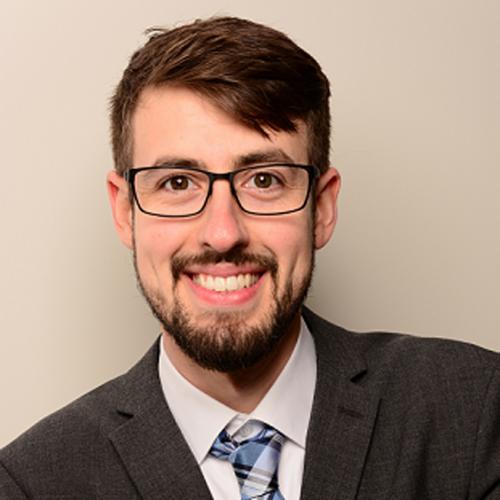
Tobias Hensel

Tobias Hensel
PHD Candidate | Berliner Wasserbetriebe
Tobias Hensel studied food chemistry at the Technical University and then worked for three years in the private sector as a consultant for companies in the chemical industry and for research institutes. He has been working for Berliner Wasserbetriebe for four years. He began his doctorate as part of the now completed EU-wide PROMISCES project. His technical focus is on trace substance analysis of persistent and mobile substances in partially closed water cycles, particularly in municipal and industrial wastewater. He also develops application-oriented methods for long-term monitoring of complex matrices.
Finalists
Dr. Christian E. Halbig
Freie Universität Berlin
Compact Water
Dr. Christian E. Halbig
Freie Universität Berlin
Compact Water
The scope of Compact Water is to develop a compact, robust and highly mobile water treatment plant that contrasts with those used for large-scale, stationary commercial water desalination in specialised facilities. It will be approximately the size of a shoebox and is designed to reliably provide small amounts of water for around 5-10 people per day from seawater or wastewater. The device shall be operated manually or semi-automatically, using a solar-powered electric motor. This means that large quantities of water no longer need to be transported, as they can be produced on site. The critical component is the use of novel, highly efficient, cost-effective graphene oxide-based nanofiltration membrane with incorporated clay partiles. That system will improve the survival chances of rescue workers in extreme situations and states of emergency, such as natural disasters and military conflict, for civilians and national defence forces near the front lines.
Dr. Gustav Graeber, Maria Geidel
Humboldt-Universität zu Berlin
High-performance atmospheric water harvester (HYVEST)
Dr. Gustav Graeber, Maria Geidel
Humboldt-Universität zu Berlin
High-performance atmospheric water harvester (HYVEST)
Ensuring sufficient fresh water for the global population is a key challenge of the 21st century. Sorption-based atmospheric water harvesting (SAWH) using hygroscopic hydrogels offers a promising solution as a regular water source for dry rural regions (1), as an emergency backup (2) and for outdoor activities (3). SAWH involves three steps: capturing humidity with a sorbent, heating it to release water vapor (e.g., via solar energy), and condensing it into potable water. Efficient materials for SAWH need high surface area for humidity capture and good thermal conductivity for vapor release. The HYVEST project addresses this by developing thin, uniform hydrogel coatings on aluminum and carbon foams. Initial dip-coating tests on flat samples were successful. Now, the method will be extended to 3D foams, creating lightweight, efficient composite sorbents, which represent the central innovation of our SAWH device. Thereby, we aim to create an economically competitive water harvester that offers a direct technological response to the global water crisis.
Dr. Ella Steins, Nikolai-Iraj Sanamrad
Technische Universität Berlin
iOLE - intelligent online leak detection
Dr. Ella Steins, Nikolai-Iraj Sanamrad
Technische Universität Berlin
iOLE - intelligent online leak detection
With over 120 billion cubic meters of water lost every year globally and an annual global cost of over 39 billions of US$, leakages in water distribution networks still pose major challenges to water utilities. Despite numerous technological advances, the adoption of digital leakage detection technology remains a slow process. In the project iOLE - intelligent Online LEakage detection - we aim to make automated leak detection practical, robust, and user-friendly. Combining model-based hydraulic analysis with datadriven methods, iOLE enables monitoring and early leakage identification under real-world conditions. A human-centered interface integrates operator feedback to ensure transparency and acceptance in utility workflows. By enhancing reliability and usability, iOLE can substantially reduce water and related energy and CO2 emissions, and strengthen the resilience of water supply infrastructure, creating economic and environmental benefits towards a sustainable water future.
Abdelrahman Ahmed Ali Abdelrahman
Technische Universität Berlin
DeepANN-Hydro3D
Abdelrahman Ahmed Ali Abdelrahman
Technische Universität Berlin
DeepANN-Hydro3D
The project is developing an innovative method for high-resolution 3D modelling of the geometry and structures of near-surface aquifers formed during the Ice Age in the Berlin-Brandenburg area. Borehole data and hydrogeological profiles are automatically digitised using artificial neural networks, achieving a model accuracy of up to 98%. The resulting subsurface models are converted into 3D groundwater flow models to analyse water management technologies such as managed aquifer recharge (MAR) and nature-based solutions (e.g. freshwater injection to prevent salt intrusion). The aim is to identify optimal infiltration and injection locations, quantities and timing.
This integrative approach combines deep learning, flow and geological modelling with optimisation and field measurements and provides robust decision support for mitigating the effects of climate change, preserving groundwater quality, sustainable water management and minimising salt intrusion.
Dr. Mohammad Fardin Gholami, Dr. Siamak Gholami
Humboldt-Universität zu Berlin
Ecopotfilter – Modular Biopolymer Based Water Filtration for Heavy Metal Ion removal
Dr. Mohammad Fardin Gholami, Dr. Siamak Gholami
Humboldt-Universität zu Berlin
Ecopotfilter – Modular Biopolymer Based Water Filtration for Heavy Metal Ion removal
The Ecopotfilter platform represents a modular, intelligent system for sustainable greywater and wastewater purification, reuse using low-cost, biodegradable biopolymers. Developed through three innovation phases, (1) ChiCel, a chitosan–cellulose filter proven to remove heavy metals (Gholami et al., 2020); (2) Ecopots, connectable plant-based modules integrating ChiCel filters and variants for E. coli removal and phytoremediation (data in publication); and (3) ChiCel–Ac, a citric-acid cross-linked filter under current development for selective Li⁺, Ca²⁺, and Mg²⁺ removal. The system combines abiotic and biotic filtration, this recyclable, scalable solution bridges laboratory innovation with real-world application for industrial, municipal, and domestic use, aligning with Germany’s 2023-2050 Water Strategy and SDGs 6, 9, 12, and 13.
Dr. Alejandro José Lorente Sanchez, Dr. Olaf Wagner, Ana Zidar
Freie Universität Berlin
Bio-Adsorberperlen zur Wasseraufreinigung
Dr. Alejandro José Lorente Sanchez, Dr. Olaf Wagner, Ana Zidar
Freie Universität Berlin
Bio-Adsorberperlen zur Wasseraufreinigung
Our junior research group has developed a method for producing adsorbent materials based on chitosan and biogenic waste streams. The bio-based adsorbent beads can be integrated directly into existing water treatment systems and, through targeted chemical and physical modifications, enable the efficient removal of organic pollutants, especially PFAS.
The materials are characterised by high selectivity and thus higher efficiency than activated carbon. At the same time, they are more sustainable and cost-effective than petroleum-based ion exchange resins due to their low manufacturing costs and the use of renewable raw materials and waste streams. The manufacturing process is environmentally friendly as it is solvent-free and carried out under moderate temperature and pressure conditions.
Initial experiments show a significant reduction in PFAS (e.g. PFOA) and pharmaceutical residues (e.g. diclofenac) and demonstrate the high application potential of the materials in water treatment and PFAS remediation.
We want to contribute to ecological water purification and the reduction of fossil materials.
"Flüssig bleiben"
The entire campaign on the topic of ‘Water & Water Management’:
